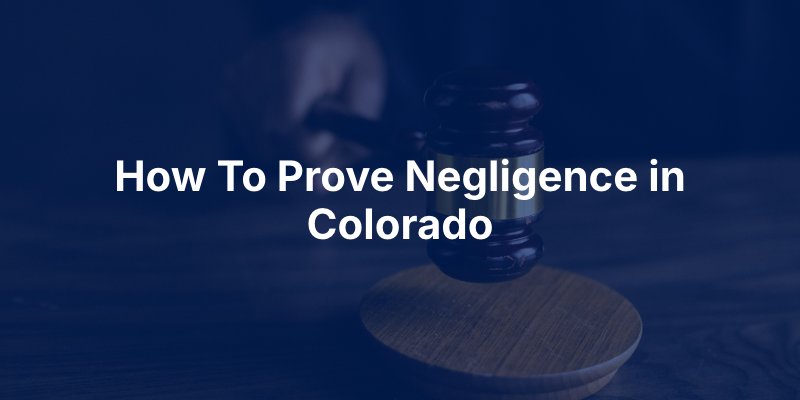If the fault of another party has injured you, you may be entitled to recover compensation. While some personal injury cases are based on intentional actions, most injury claims are founded on negligence.
To be successful, you must prove the defendant’s negligence. Proving negligence can be challenging.
However, our Denver personal injury attorneys at Dan Caplis Law have the experience, skills, and resources to build our clients’ strongest case, prove the defendant’s negligence, and help them recover maximum compensation for their damages. Contact us to schedule a free consultation today.

What is Negligence?
Negligence can be defined as the failure to exercise the standard of care that a reasonably prudent person would have exercised in a similar situation. When a party’s negligence causes harm to another, the victim may recover compensation for their damages.
Proving Negligence in Colorado
Most personal injury cases are based on negligence. Proving negligence requires proving that the following four elements exist:
- The defendant owed a duty of care to the plaintiff. For example, all drivers owe a duty of care to operate their vehicle as a reasonably prudent person would under similar circumstances to avoid causing harm to others.
- The defendant breached their duty of care. A driver who unreasonably runs a traffic light and crashes into another person may have breached their duty of care.
- The defendant’s actions or inactions caused the plaintiff’s injuries. It is not enough that the defendant ran the traffic light if the plaintiff’s injuries were not caused by running the traffic light.
- The plaintiff suffered actual damages caused by the defendant’s breach of duty. If you cannot prove your damages, you cannot recover compensation.
What is Gross Negligence?
Gross negligence typically occurs when a defendant acts recklessly. Their actions show a conscious disregard for the safety of others. An example of gross negligence is when a person decides to drive while intoxicated.
What is Negligence Per Se?
Negligence per se happens when a defendant violates a law and causes you harm. In these cases, you must prove that the defendant violated a law that was supposed to protect you from the specific injury you suffered and that the defendant’s violation of the law caused your injury.
What is Modified Comparative Negligence?
Colorado follows a modified comparative negligence model. This means that if you are less than 50% at fault in the accident that caused your injury, you may still be able to recover compensation from the other at-fault parties.
However, your compensation will be reduced by the percentage of fault assigned to you. For example, if you are found to be 30% at fault and your damages total $10,000, you may still be able to recover $7,000 after your percentage of fault is deducted.
If you are found to be 50% or more at fault, you cannot recover any compensation for your damages.
What Evidence Is Used to Prove Negligence?
The evidence used to prove negligence varies depending on the facts of each case. Some types of evidence we may use include:
- Police reports.
- Medical records.
- Expert witness testimony.
- Eyewitness testimony.
- Surveillance video.
- Photographs.
- Dashcam footage.
- Traffic camera footage.
- Electronic data recording devices (vehicle black boxes)
- Any other evidence that supports your claim.
At Dan Caplis Law, our personal injury attorneys in Denver carefully select the evidence to prove your claim and maximize your compensation.
How Much Is My Case Worth?
The value of a negligence claim depends on the specific facts of each case. After our attorneys have evaluated the facts of your claim, we can advise you on what we believe would be a fair settlement of your case.
In a successful negligence case, you should be able to recover economic and non-economic damages. Economic damages include medical expenses, lost wages, property damages, and other losses or costs incurred by your injuries.
Non-economic damages include pain and suffering, mental and emotional distress, and other intangible losses and damages.
In most negligence cases, you will not recover punitive damages. Punitive damages, also known as exemplary damages, are reserved for cases in which the defendant’s actions are taken with fraud, malice, or willful and wanton disregard for the safety of others. This type of damages may be appropriate in cases of gross negligence.
Schedule a Free Consultation Today
Our attorneys have been proving negligence and recovering record-setting awards and settlements for decades.
If another party’s negligence has injured you, we want to help you recover maximum compensation for your damages.
Schedule a free consultation by calling (303) 770-5551 or visiting our contact page. We look forward to meeting you, answering your questions, explaining your rights, and helping you get the justice and compensation you deserve.




